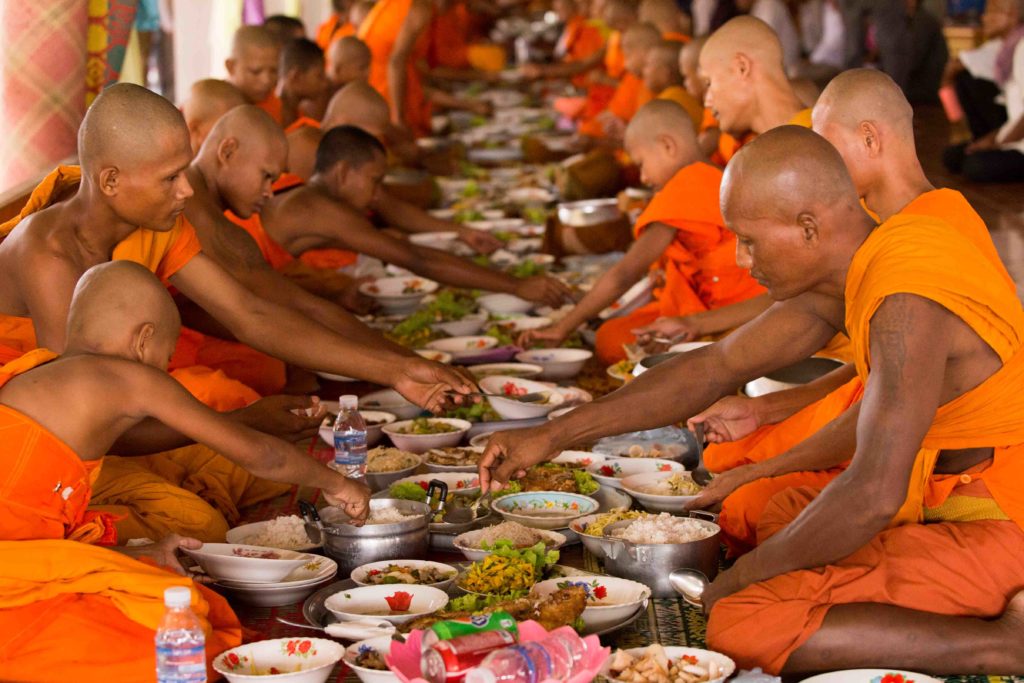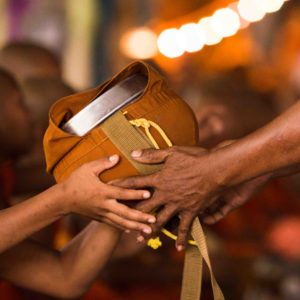

Vassa, three month Buddhist rains retreat.
For dates and a full list of festivals in Cambodia click HERE!
Vassa, sometimes called rains retreat, is a three month retreat beginning on the first day of the waning moon of the eighth lunar month, normally around the end of July. For the three months, the monks will mostly stay in there pagodas, practicing buddhist rituals, extended periods of meditation and an increased amount of activity in the pagodas, a good time to be in Cambodia if you enjoy local culture.

Lighting the candles for Vassa
This Buddhist retreat coincides with wet season, and stems from India, where traveling holy men would come to rest for a three month period during the rain season. Traveling during wet season was difficult and brought increases risk of damage to newly planted crops. During this period of rest, the holy men would increase there intensity of spiritual practices. Buddhism has a similar story to that of the Hindu religion, the monks would not travel for three months and practice Buddhist rituals. Many aspects of Buddhism and Hinduism are the same.

Increased activity in the pagodas, in this case the monks and nuns doing a complete restoration
In Cambodia, during this three month period we can witness extended periods of meditation signaled by the banging of a drum every morning (now less popular in city areas, it’s at 4.30am so an early start) and evening (5 – 5.30pm). Khmers will often light a candle, always a great photo opportunity. Some keep this flame alight for the three months of Vassa, believing that it will bring the good will, a belief not true. The educated monks will light the candle for chanting and meditation only. The candle stems back to times of no electricity.
Practicing of Buddhism was disrupted in Cambodia during the Khmer Rough period. Whilst buddhism was still practiced, education ceased. Practicing rituals continued but without the knowledge being passed down from the books of Tripitaka. Bringing back education was met with hostility due to current practices and ignorance of education, but after many years things are starting to change for the better, with a greater understanding.
Pchum Ben – Ancestors day – Usually falls around early October.
Two months into Vassa, Pchum Ben is celebrated, a fifteen day Buddhist ceremony. Pchum Ben being a Pali phrase meaning ‘together rice’ (food). Offerings in the form of rice balls are made to ancestors and the monks, a great time to be in Cambodia with increased activity in the pagodas. Visitors are welcome to join, but please be respectful in pagodas.
Prior to Vassa, monks would visit houses for food donations, alms. During Vassa, rather than go and collect, the people would bring offerings to their local pagodas. Family members would take it in turn to take offerings to their pagoda. This is for the three month period, which was reduced to 15 days during the rein of king Ang Doung as the people of Cambodia were poor during this period.

Food offerings aplenty
The fifteen days of Pchum Ben are known as ben one, ben two, ben three etc., the fourteenth day being called ‘Kan Ben’ leading up to the final day, ‘Pchum Ben’, when the gates of hell are open and the spirits of ancestors are said to be at their most active. The spirits will visit seven local pagodas in search for food from their relatives, the food believed to give them some relief from their torturing from hell, failure to do so may bring a curse onto the family. The living relatives will make offerings in the form of rice balls thrown in the fields around their pagoda early morning .
seven local pagodas in search for food from their relatives, the food believed to give them some relief from their torturing from hell, failure to do so may bring a curse onto the family. The living relatives will make offerings in the form of rice balls thrown in the fields around their pagoda early morning .
Pchum Ben – ‘together rice / food’ brings communities together. The first offerings are to ones parents who are the best people in the world, the second offerings are dedicated to the spirits which are given to the monks, whom chant and calm them. The third offerings are for the poor and the animals around the pagoda, a sign of unity, bringing together.
Today, in towns or cities, we witness an excess of offerings due to the wealth of the people, often wasted. It is important for people to go back to their home lands, the rural areas and make offerings where nothing goes to waste, as these communities are often poorer that their relatives within the cities. All in all, a good time to visit, especially on the final three days of Pchum Ben, with the added benefits of less tourists and the temples looking at their best. Mostly it is business as usual, however locals will visit their pagoda, which may mean some places will close.


Heading to Cambodia? Check out our Survival guide to Angkor Wat.


2 comments. Leave new
Amazing pics and amazing story!😊
Thanks Mirela, it’s great to be here with this wonderful culture 🙂